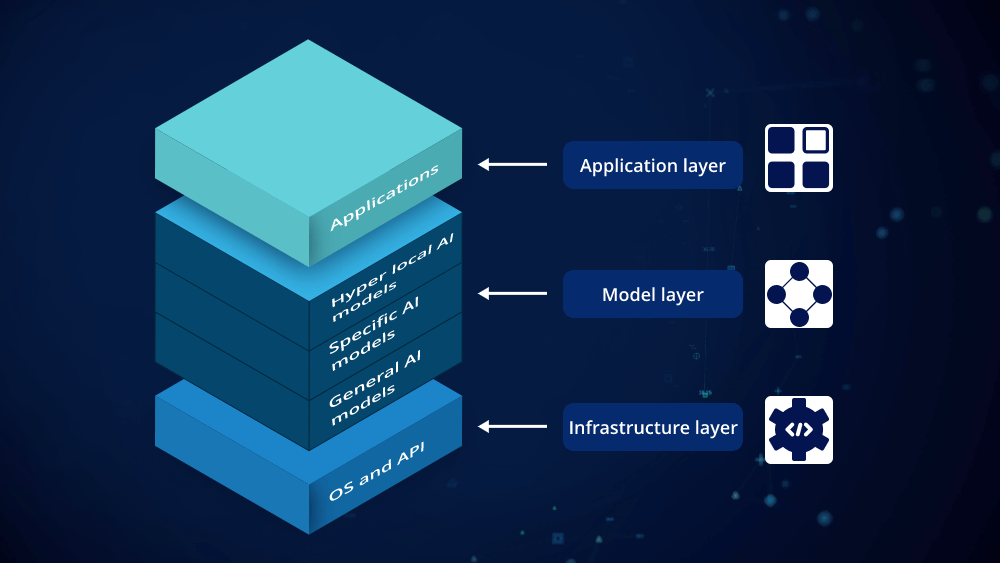| Keywords | Current Repetition |
| enterprise application | 5 |
| application services | 6 |
| business application services | 2 |
| enterprise application services | 2 |
| enterprise application solutions | 1 |
| application modernization | 2 |
| application management services | 2 |
Application management struggles to meet the needs of modern users and businesses as it becomes more complex. Traditional management approaches for enterprise applications often fail to align with the increasing demands of scalability, efficiency, and user experience. Over 88% of customers do not return to an application if they have a poor user experience. This highlights the need to optimize the entire application for efficient user experience, from front-end interfaces to back-end infrastructure.
Integrating AI-driven approaches with full-stack operations ensures that all layers of app development and management work together to meet growing demands. Enterprise application services enable this integration by providing the most efficient predictive analytics, real-time issue resolution, and intelligent automation services. These capabilities promote streamlined app management, enhance user satisfaction, and help deliver exceptional digital experiences.
Managing an App with Business Application Services
Full-stack operations help businesses manage the entire lifecycle of any application. They ensure that all components of the same application work together efficiently, including front-end, back-end, databases, and server infrastructure. However, gaps often persist in these activities, which include siloed operations, manual processes, a lack of visibility, and insufficient monitoring.
Here’s how application services bridge the gap between these layers and support application lifecycle management.
- Application management services provide developers with unified tools and workflows to remove silos in the development process. They ensure that teams can collaborate across the stack, minimize miscommunication, and reduce the time required to debug incompatibilities.
- Traditional app management often encounters issues like configuration mismatches or overlooked dependencies during deployment. Enterprise application solutions utilize containerization and orchestration platforms to ensure all applications are deployed in consistent environments.
- Enterprise application services employ continuous monitoring and automated alerts for the early detection of performance degradation or system failure. This proactive approach makes maintenance more manageable and cost-effective.
Although full-stack operations already help businesses improve their app management strategies, organizations can integrate them with AI to promote next-gen app management.
Integrating AI-Driven Approaches to Transform App Management
The integration of AI into full-stack operations can transform how businesses manage the development, deployment, and maintenance of applications. Utilizing application management services for this integration enables enterprises to leverage advanced technologies like AIOps (Artificial Intelligence for IT Operations), intelligent automation, and DevSecOp for application modernization.
1. Modernizing “Run” Operations
AI integration can streamline routine application management processes, reduce human intervention, and improve efficiency. Key transformations that enterprise application services can offer include:
- Predictive Insights: AI-driven models analyze historical and real-time data to predict potential system issues. This predictive capability reduces downtime and enhances system reliability.
- Cognitive Automation: AI-enabled solutions automate repetitive processes like ticket resolution and system upgrades. Digital assistants can handle these tasks and decrease the workload for IT personnel. This allows them to focus specifically on strategic projects.
- Self-Healing Systems: AI-powered anomaly detection and self-healing capabilities enable apps to automatically remedy minor faults. This increases operational resilience and user experience significantly.
2. Accelerating Change Through Modern Engineering
AI-driven application modernization promotes agility and innovation in app development and deployment.
- DevSecOps Integration: AI can automate code quality checks, vulnerability assessments, and compliance validation. This helps accelerate DevSecOps processes to ensure secure and rapid application delivery.
- High-Performance Engineering Pods: Business application services can leverage AI to enable autonomous full-stack development environments. It utilizes intelligent tools for code generation, testing, and deployment.
- Application Portfolio Rationalization: AI-based analytics help identify redundant or underperforming applications. This helps businesses reduce technology debt and transition to modern, scalable architectures, such as microservices and event-driven designs.
3. Enabling Platforms for Accelerated Value Realization
Platform-driven AI approaches ensure that app management becomes strategic. They offer businesses an excellent way to derive more value from their IT investments.
- Unified Toolsets and Ecosystems: AI platforms integrate with existing enterprise toolsets. This creates a cohesive environment for managing development, operations, and analytics.
- Operational Analytics and Business Insights: The capability of AI to analyze vast amounts of operational data provides businesses with actionable insights to align app performance with business objectives.
- Cloud-Ready Scalability: AI facilitates efficient cloud migrations and optimizations to ensure that all applications are scalable and cost-efficient.
Bottom Line
Application services empower businesses to harness the synergy of full-stack operations and AI. This, in turn, drives operational excellence and enables sustained growth. Next-gen app management also helps enhance application efficiency, smoother workflows, and faster time-to-market through automation through this integration. Intelligent interfaces and personalization associated with this process help improve user experiences to meet modern expectations.
Machine learning, cloud-native development, and intelligent automation will gain more importance in the future as enterprises seek to leverage the full potential of next-gen app management. Organizations can embrace this technological evolution to build resilient, scalable, and future-ready app ecosystems. This will enable them to offer exceptional value to their users for sustainable growth.































